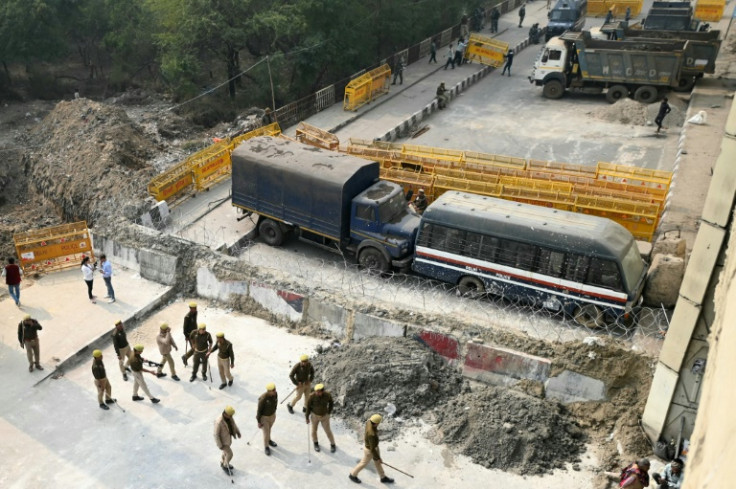Young Farmer Dies Amid Police Action Against Protesters In India
The young man from the Indian state of Punjab has reportedly become the first casualty in the protests.

Shubkaran Singh, a 22-year-old Indian farmer, succumbed to injuries sustained during police action against farmers on Wednesday.
The incident took place in the town of Khanauri, near the border between Punjab and Haryana states, when farmers resumed their march to Delhi and the police tried to stop them. Singh died of a head injury received during the police action at the Khanauri border.
"He was already dead when he was brought to hospital at around 3 pm. He suffered bullet injuries in his head," Harnam Singh, medical superintendent at the Government Medical College and Rajendra Hospital in Patiala, told The Indian Express.
The Congress alleged that the protestor, Shubhkaran Singh, died at the Khanauri town due to police action
— shoaib daniyal (@ShoaibDaniyal) February 22, 2024
https://t.co/vRvPR85umA via @scroll_in
Meanwhile, DIG (Patiala range) Harcharan Singh Bhullar has claimed that Singh was hit by a rubber bullet.
Singh, who hails from Balloh village in Bathinda, Punjab, has reportedly become the first casualty in the protests. The farmers have suspended their agitation for two days in the wake of Singh's untimely death.
All entry points to Delhi have been barricaded to stop protesting farmers from entering the city. Barbed wires, concrete slabs, iron spikes, and a huge number of paramilitary forces have been deployed to stop the march.
Haryana Police is crossing all the boundaries of hooliganism. Look at these images and see how after entering Punjab at Khanauri Border, they’ve damaged the farmers’ tractors, bikes and cars. Their hooliganism is responsible for the 22-year-old Shubhkaran losing his life.
— Praveen (@praveenpscs) February 22, 2024
Photos… pic.twitter.com/QMev27SWCF
The farmers have called for a march to Delhi over a list of demands that include a law on the minimum support price for crops and loan waivers. The agitation is being spearheaded by farmers' organisations such as the Samyukta Kisan Morcha (non-political) and the Kisan Mazdoor Morcha.
The BJP-led government has come under fire for its heavy-handedness. The opposition parties have slammed the government for not letting the farmers enter Delhi for a peaceful protest march.
"...After lying & mistreating our farmers for 10 years, the BJP government is now KILLING THEM WITH IMPUNITY. The concerning developments at Khanauri border indicate gross human rights violations & endanger our democracy," wrote All India Trinamool Congress leader and West Bengal Chief Minister Mamata Banerjee.
Congress leader Rahul Gandhi wrote:"This violence against our youth and farmers must end. We demand justice for Shubhkaran and call for an immediate, peaceful resolution to the protests".
Heartbreaking news from Khannauri, Punjab: A young life, Shubhkaran Singh, son of Charanjeet Singh from Ballo, Bathinda, aged 21-22, was tragically lost due to police action against peaceful farmer protests. This violence against our youth and farmers must end. We demand justice… pic.twitter.com/pn0YnI2ByM
— Haryana Youth Congress (@Haryana_YC) February 21, 2024
Several videos and images have gone viral on social media platforms wherein the police can be seen firing tear gas shells and using pellet guns to prevent farmers from entering Delhi. All borders connecting India's capital have been fortified.
It needs to be noted that the Indian Constitution gives people the right to protest peacefully. It is subject to reasonable restrictions, but people can take to the streets within legal and constitutional limits.
The right to protest stems directly from the rights given under Article 19, which guarantees various freedoms to Indians, including the freedom of speech, expression, assembly, association, and movement.
Why are the farmers protesting?
Thousands of farmers have come together to call for legislation to ensure a minimum support price (MSP) for all crops.
The MSP is the cost at which the government purchases crops from farmers. It ensures that farmers do not have to sell their produce in desperate circumstances and that they get the appropriate amount for their harvest amid market uncertainties.
They are also demanding debt waivers and pensions for farmers and farm labourers. They have also asked for an increase in daily wages and the number of days employment is provided under the government's MGNREGA scheme.
MGNREGA promises to give a minimum of 100 days of unskilled manual labour to rural households whose adult members volunteer for it. Protection of land, forests, and water sources belonging to tribal communities is also among the demands put forward by protesting farmers.
They have also demanded compensation for the farmers who died during the 2020–2021 protests and the dismissal of a Union minister whose son is accused of mowing down farmers in Uttar Pradesh's Lakhimpur Kheri district in October 2021.
The 2020–2021 protests were held against three farm bills passed by the Indian government that allowed farmers to sell produce directly to bulk buyers and made contract farming easier.
The government was forced to withdraw the three bills in 2021. The government had then promised that they would set up a panel of farmers and state officials to find ways to ensure support prices for all crops. The protesters have accused the BJP government of not fulfilling the promise.
© Copyright IBTimes 2025. All rights reserved.






















